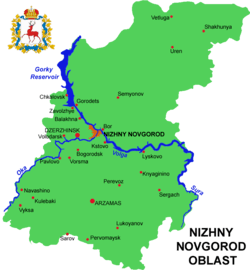Ushkuiniks

The Ushkuiniks (Russian: ушкуйники), also Russian pirates from early Rus' state, originated in medieval Novgorod, composed among other of Ilmen Slavs who supposedly led the Viking-like life of fighting, killing, and robbery.[1] The Ushkuiniks were widespread in large parts of the Russian north.[2] The origin of the term Ushkuiniks is unknown. Most likely the word "ushkui" derives from the Oskuya River in Russia. Other theories suggest the term derived from the Russian word узкоу (Uzkou), plural: узкие (Uzkiye), which translates as tight or narrow.[3] Furthermore medieval Finnic type of flat-bottom ships are called uisk (literally a 'snake'), which could be easily transported over portages between watersheds, is also considered as the namesake.
Although the Novgorodians took part in the Tsargrad expeditions of the 10th century and mounted pillaging raids to Finland in the 12th century (compare Swedish–Novgorodian Wars), the Ushkuiniks first appear in the historical record as an organized force in the 1320s. Arranged in squadrons which could number several thousand, the Ushkuiniks enjoyed the patronage of influential boyar families of Novgorod, who used them to demonstrate Novgorod's military clout to its neighbours and to advance its trade interests and influence in the Volga region and other Rus' regions.
During the famous campaign of 1360, the ushkuiniks sailed from Novgorod by the portages to the Volga river. Under command of boyar Anfal Nikitin, they gained possession of Zhukotin, a trade emporium in Volga Bulgaria. A ruler of the Golden Horde, which controlled Zhukotin, was furious and ordered Grand Prince Dmitry Konstantinovich to capture the Ushkuiniks and to bring them to the Horde for trial, but Dmitry's punitive expedition failed.
In 1363 the pirates launched the first Novgorodian raid along the Ob River in western Siberia. Three years later, without consulting their superiors in Novgorod, they approached Nizhny Novgorod and, wishing to punish Dmitry for his hostile action, massacred Armenian and Tatar merchants trading there. This led to a diplomatic row, when Dmitry demanded apologies from Novgorod Republic.
In 1371 the Ushkuiniks sacked Yaroslavl, Kostroma and other Upper Volga cities. Three years later they sailed with upwards of ninety ships to pillage the Vyatka region. In 1375, they defeated the militia of Kostroma and burnt the city to the ground. The destruction was so severe that Kostroma had to be rebuilt elsewhere. After that, they looted Nizhny Novgorod and sailed down the Volga to Astrakhan, where they were annihilated by a Tatar general.
By 1391 the Ushkuiniks had recovered from this reverse and felt strong enough to resume their activities. At that period their patrons included Narimantas and Patrikas, the overlords of the Korela district that later became known as Ingria. In 1391 the pirates sacked both Zhukotin and Kazan. With Muscovy's power on the ascendant, however, Novgorod Republic was pressed into putting down their filibustering activities in the first decades of the 15th century.
See also
References
- ↑ Allworth, Edward A. (1994-10-01). Central Asia: One Hundred Thirty Years of Russian Dominance, a Historical Overview (in Englisch) (003 ed.). Durham: DUKE UNIV PR. p. 22. ISBN 9780822315216.
- ↑ "Ushkuiniki: the Last Pirates of Old Rus - Nicholas Kotar". Nicholas Kotar. 2016-06-10. Retrieved 2018-10-13.
- ↑ "узкие - English translation – Linguee". Linguee.com. Retrieved 2018-10-13.
- ↑ Uisu arengulugu, uisk.ee

- Vernadsky, Viktor Nikolayevich (1961). Новгород и новгородская земля в XV веке (Novgorod and the Novgorod Land in the 15th Century). Leningrad (Saint Petersburg): published by the USSR Academy of Sciences. pp. 36–51.
